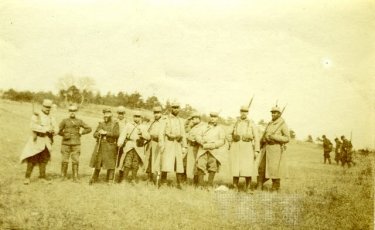
Henri Gaudier-Brzeska (1891-1915) standing in the midst of fellow soldiers 1915.
I wanted to quote the Ezra Pound poem, and then I found a particularly splendid framing for the poem by Wen Stephenson in the January 2005 issue of the Atlantic, so fine that I feel obliged to include it, as well.
“E has sent me the Chinese poems,” wrote a young French-born sculptor named Henri Gaudier-Brzeska, who was serving as an officer on the Western Front, to his London patron Olivia Shakespear on April 11, 1915. “I keep the book in my pocket, indeed I use them to put courage in my fellows. I speak now of the ‘Bowmen’ and the ‘North Gate,’ which are so appropriate to our case.”
[S]omething triggered a memory of Gaudier-Brzeska at the front and the little book he kept in his pocket.
That book, Cathay, published in London in April 1915, was a curious pamphlet containing eleven “Chinese” poems by Ezra Pound. It came in a drab tan wrapper—a reference, perhaps, to the uniforms then being worn, and shredded, in Belgium and France.
At the front of the volume appeared this puzzling inscription:
For the most part from the Chinese of Rihaku, from the notes of the late Ernest Fenollosa, and the decipherings of the professors Mori and Ariga.
Some explanation, some deciphering, is required. Rihaku is the Japanese form of Li Po, the great T’ang Dynasty poet who lived from 701 to 762. Ernest Fenollosa (1853-1908) was an American scholar of Far Eastern literature whose voluminous notes on classical Chinese poetry—compiled in Tokyo in 1896-99 and containing the Chinese characters accompanied by rough English translations of the poems—had been entrusted to Pound by Fenollosa’s widow in 1912. The professors Mori and Ariga were the Japanese scholars who served as Fenollosa’s translators and interpreters of the Chinese texts. Fenollosa, you see, couldn’t read Chinese. Neither could Pound.
There is much more to be said, about the text of Cathay itself and about Pound’s theory of “Imagisme” and his understanding, erroneous as it may have been, of the Chinese written character or “ideogram.” (For further decipherings, Richard Sieburth’s notes on Cathay in the Library of America’s recently published Ezra Pound: Poems and Translations are highly recommended, as is the chapter entitled “The Invention of China” in Hugh Kenner’s 1971 study The Pound Era.) T. S. Eliot famously called Pound “the inventor of Chinese poetry for our time.” But what Pound invented here had little to do with Chinese and everything to do with his time, our time—maybe all times.
So it was that somewhere in the trenches near the Marne in the early spring of 1915, the twenty-three-year-old Henri Gaudier -Brzeska read to his troops the following poem from Cathay, the one referred to in his letter as the “North Gate.” It’s a text, it has to be said, that is not so much translated—Pound’s Chinese “translations” are notoriously inaccurate, though accuracy as such was hardly the point—as derived, paraphrased, transmuted from the eighth-century source (by way of professors Fenollosa, Mori, and Ariga) into a new and startlingly powerful, startlingly alive, English poem.
To Gaudier-Brzeska in the trenches—despite the layers of history, geography, and language, of cultural and aesthetic mediation, separating him from the original Chinese—the poem, by some uncanny process, rang as true, as immediate, as any news bulletin. If literature is “news that stays news,” as Pound would later write, then here is a war poem appropriate to the ages.
-
Lament of the Frontier Guard
By the North Gate, the wind blows full of sand,
Lonely from the beginning of time until now!
Trees fall, the grass goes yellow with autumn.
I climb the towers and towers
to watch out the barbarous land:
Desolate castle, the sky, the wide desert.
There is no wall left to this village.
Bones white with a thousand frosts,
High heaps, covered with trees and grass;
Who brought this to pass?
Who has brought the flaming imperial anger?
Who has brought the army with drums and with kettle-drums?
Barbarous kings.
A gracious spring, turned to blood-ravenous autumn,
A turmoil of wars-men, spread over the middle kingdom,
Three hundred and sixty thousand,
And sorrow, sorrow like rain.
Sorrow to go, and sorrow, sorrow returning,
Desolate, desolate fields,
And no children of warfare upon them,
No longer the men for offence and defence.
Ah, how shall you know the dreary sorrow at the North Gate,
With Rihoku’s* name forgotten,
And we guardsmen fed to the tigers.
By Rihaku
[*Rihoku, not to be confused with Rihaku [Li Po], is the Japanese for Li Mu, a Chinese general who defended China against the Tartars and died in 223 B.C.E. (Richard Sieburth, Ezra Pound: Poems and Translations, Library of America, 2003).]
In his last letter to Mrs. Shakespear, on May 29, Gaudier-Brzeska wrote: “Today is magnificent, a fresh wind, clear sun and larks singing cheerfully. The shells do not disturb the songsters…. They solemnly proclaim man’s foolery and sacrilege of nature. I respect their disdain….”He would be killed on June 5, 1915, in a charge at Neuville St. Vaast.
—————————–
Li Po aka Li Bai Wikipedia entry.





Please Leave a Comment!